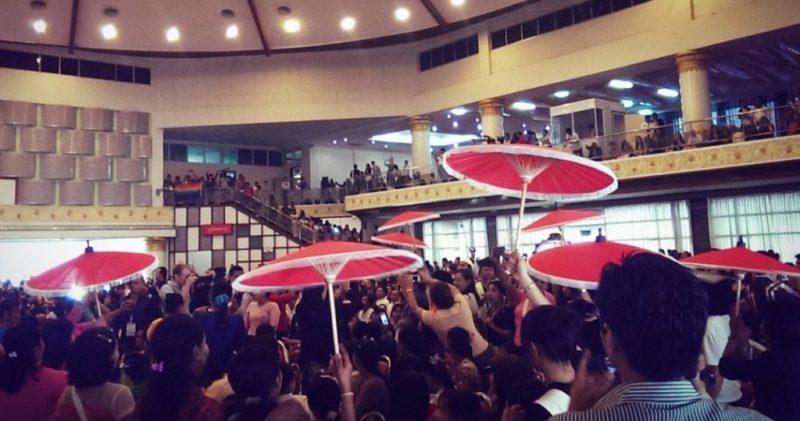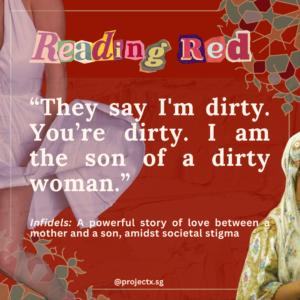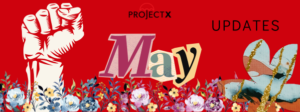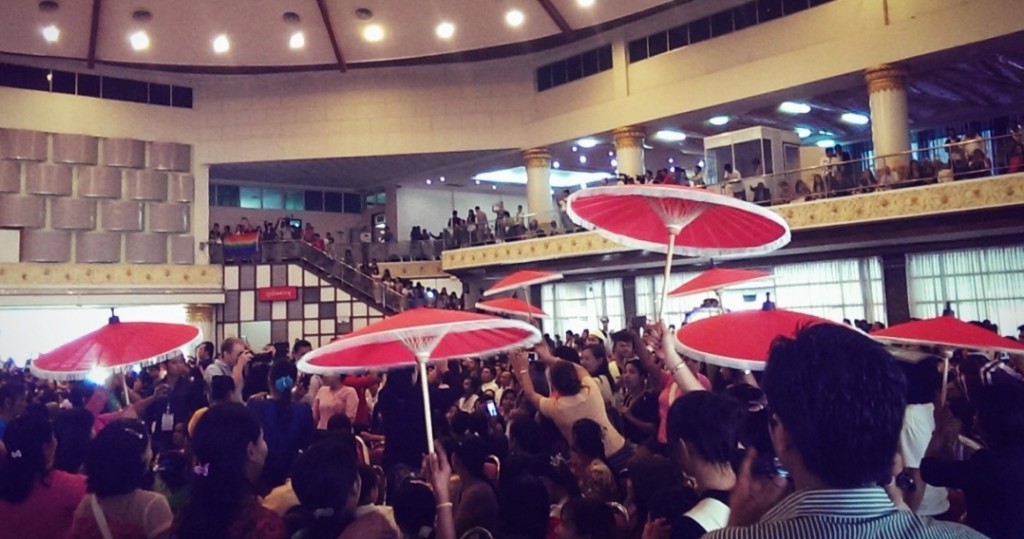
Over the weekend of 21st to 23rd March 2014, sex workers from all over ASEAN (including Timor Leste, but excluding Brunei) gathered at the ASEAN Civil Society Conference/ ASEAN People’s Forum in Yangon, Burma/Myanmar. The Sex Workers of ASEAN network (SWASEAN) was spearheaded by Empower Thailand—a sex worker community based organization established in 1984—almost two years ago in order to combat the deafening silence over sex workers rights within ASEAN.
SWASEAN was joined by many other civil society groups at this forum, including but not limited to, the ASEAN SOGIE Caucus who are lobbying for the rights of lesbians, gays, bisexuals, trans*, intersex, and queer peoples; migrant workers, disability rights activists, women, youths, older persons, ethnic and indigenous peoples, religious minorities, refugees, political prisoners, drug users, and people living with HIV/AIDS.

The aim of the forum was to discuss the issues faced by the peoples of ASEAN in order to highlight to the ASEAN heads of state, and work towards a genuinely people-centred ASEAN.
For sex workers, the key issues raised are that of stigma and discrimination. Stigma and discrimination lead to the restricted access to high standards of sexual and reproductive health resources and services, the lack of protection under national labour laws, the criminalizing of part or whole of sex work leading to the incarceration of many throughout ASEAN, and the lack of recognition as equal rights bearers.
Furthermore, with the formation of the ASEAN Economic Community come 2015, sex workers question whether they will benefit in any way. In short, the ASEAN Economic Community will transform ASEAN into a region with free movement of goods, services, investment, skilled labour, and freer flow of capital. The formation of the AEC will be a boost for tourism and trade regionally, however, the fear is that sex workers will be left out once again from the gains of this policy.
In particular—with regards to the relaxing of border controls, sex workers are concerned about the continued harassment by immigration officers—especially trans sex workers, and the practice where one’s freedom of movement is curtailed simply on the suspicion that one is a sex worker. In addition, despite the foreseeable developments each country will make, sex workers will still not be able to access social security systems in place in their own countries so long as they are still regarded as criminals.
As part of the forum, workshops were being conducted by the various civil society organisations. Empower Thailand ran a workshop entitled “7 hours 55 minutes: Why Only See… SEX! SEX! SEX!?” The write up read: “We all know about the 5 minutes sex workers spend having sex… not it’s time to discover the time that the world forgot… it’s time to lift the covers on those unseen 7 hours and 55 minutes that sex workers spend at work not having sex.” The workshop was structured around a life-sized board game, monopoly-inspired money, with participants dressed up asMamasans, sex workers, clients, bankers, doctors, agents, social workers, and police officers. What was striking was how we witnessed the decision-making process that sex workers go through in their lives..
–
One example that stood out was when a Burmese sex worker decided to travel to Singapore to work. She approached an agent to help facilitate the process, and was told it will cost her USD1,000. As she did not have that kind of money, she decided to loan. She approached two people for the loan—first was her mamasan who charges 20% interest, and second was the bank who charges 15% interest. Eventually, the worker decided to borrow from her mamasan as she felt more comfortable with her, and also because she did not have the necessary paperwork (e.g. income tax statements, pay slips, etc) to borrow from the bank.
This scenario was striking as we often take systems for granted. However, it is a privilege that one has access to these systems. This scenario was also striking because “debt bondage” is one of the newest indicators of “modern day slavery”, yet it is clear from this example that debt in and of itself is not the problem—the problem is institutionalized, systemic, and legal discrimination.
The workshop ended with a dramatic raid with the game board wrecked by the police officer. There was a final count of how much money everyone had left in the game, and it was then revealed that the police (through bribes) and the clinics (through sexual health screenings) profited the most.
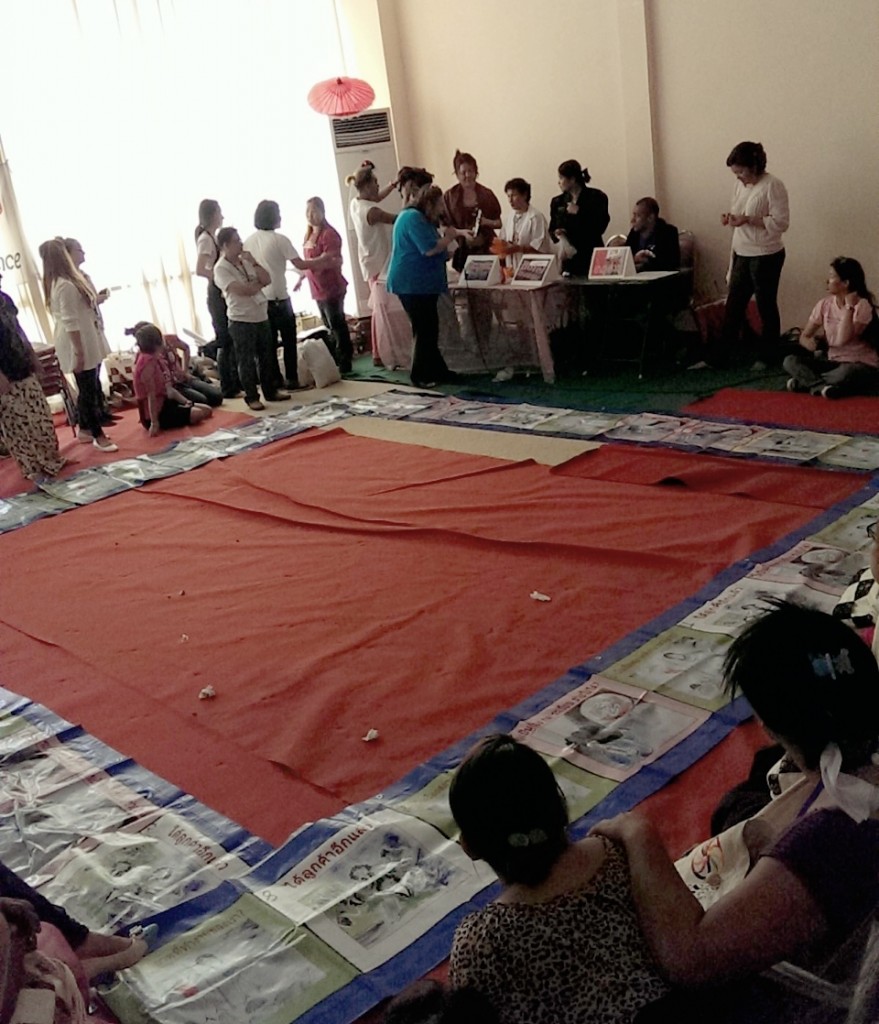
–
As a destination and transit country for many sex workers due to the affluence of our country, Singapore should play our part and make sure that our policies that relate to sex work are first and foremost transparent, and then fair and just. At any one time, there are between 800 to 1000 licensed sex workers in Singapore, with many many more working informally or unlicensed. Yet, the conditions under which licensed workers work in are not made known to the public; and informal and unlicensed workers are constantly faced with abuse from the public, bad clients, and law enforcers.
Licensed sex workers with whom Project X have met with have complained about the lack of protection from clients who are abusive or who refuse to use condoms, about the travel ban imposed on them after they conclude their contracts, and about the humiliating and degrading treatment that they receive from the anti-vice police (the department that licenses brothels and sex workers).
On the other hand, there are many sex workers who refused to be licensed, as that means being on official government records that one is a sex worker, and being subjected to work as a full-time sex worker.
As such, we urge the Singapore government to take active steps to consult people in the sex industry in order to come up with a truly fair and just regulation policy for the industry, one that will ensure the safety and dignity of the worker.
–
The full statement by civil society organizations from the forum is available here. The recommendations that sex workers wrote into the statement are to:
Recognise sex workers as equal rights bearers for their economic contribution and share in the opportunities and benefits that tourism brings to ASEAN, including but not limited to equal protection under national labour law and freedom from discrimination.
Given the status of uneven progress on SRHR in the ASEAN, governments must show political commitment and provide sustained financial investments to ensure SRHR for all, including women, young people, people of diverse sexual orientation, gender identities, and gender expression, people with disabilities, migrants, displaced peoples, sex workers, indigenous peoples, and other marginalised groups. These include reviewing, amending and implementing laws and policies to uphold human rights, including sexual and reproductive rights, and ensuring universal access to comprehensive, affordable, quality, gender-sensitive health services at all stages and across all locations, to achieve the highest standard of sexual and reproductive health; services include contraception; safe abortion services; services to ensure maternal health and nutrition; diagnostic and treatment services for STIs, HIV, infertility and reproductive cancers; counselling; and comprehensive sexuality education (CSE).



